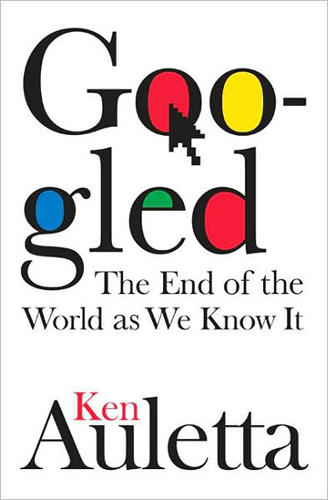Ever since its inception in the late 1990s, Google has been the issue of much debate in politics, economics and overall public welfare. From its humble beginnings as a PhD dissertation project to its current state as one of the United States’ most successful corporations, the little company that could is standing at the apex of what some may call the most revolutionary displays of entrepreneurship in decades.
 Ken Auletta’s tell-all book, “Googled: The End of the World as We Know It,” is a product of countless hours put into researching the company’s inner workings after being granted full access to the executives, engineers and all the resources he needed to write a fair and balanced analysis of Google’s past, present and future.
Ken Auletta’s tell-all book, “Googled: The End of the World as We Know It,” is a product of countless hours put into researching the company’s inner workings after being granted full access to the executives, engineers and all the resources he needed to write a fair and balanced analysis of Google’s past, present and future.
After kicking it off with an anecdotal chapter about a Viacom executive who visits Google’s Mountain View campus to talk business with the company’s higher-ups only to realize that Google was not a company he wanted to associate with, Auletta delves into Google’s beginnings with a history of its birth.
While “Googled” does a great job highlighting the innovative aspect of the company’s efforts and their many areas of success, it also expresses Google’s many fallacies and flaws, one main one being their attachment to the concept of a utopian corporation. The company seemed to be made up of engineers, and the engineers answered to no one. This hindered their abilities to make crucial decisions about design, for example.
Another sensitive subject that the book addresses is the idea of Google creating an evil empire, sometimes accused of operating outside of the law, breaking copyright laws and angering publishers.
The chapter about Google Books highlights this aspect eloquently. The concern is that by making copyrighted material available for free, Google will drive writers and publishers out of business. The same concern holds true with Google News, which compiles articles from hundreds of sources and posts them right to the site. This makes Google News the powerful “middle man” between people and the news.
The most fascinating aspect of this book is Auletta’s account of Google’s impact on the advertising industry. Before Google, advertisers took a significant risk when purchasing ad space somewhere, not knowing exactly which part of their effort will succeed. Google targeted key words and search results to cater to advertisers so they would know exactly what worked. This allowed Google to charge them much less, and therefore make more business.
Whether Google is good or evil is still a question many people like to debate, but the real answer is subjective. Auletta’s book is a wonderful guide to forming an educated decision as to whether you want to think of Google as a world-dominating monster who’s set out to drive writers, publishers and advertisers out of business or just a free-thinking group of engineers who always have the consumers’ needs in mind.

Leave a response